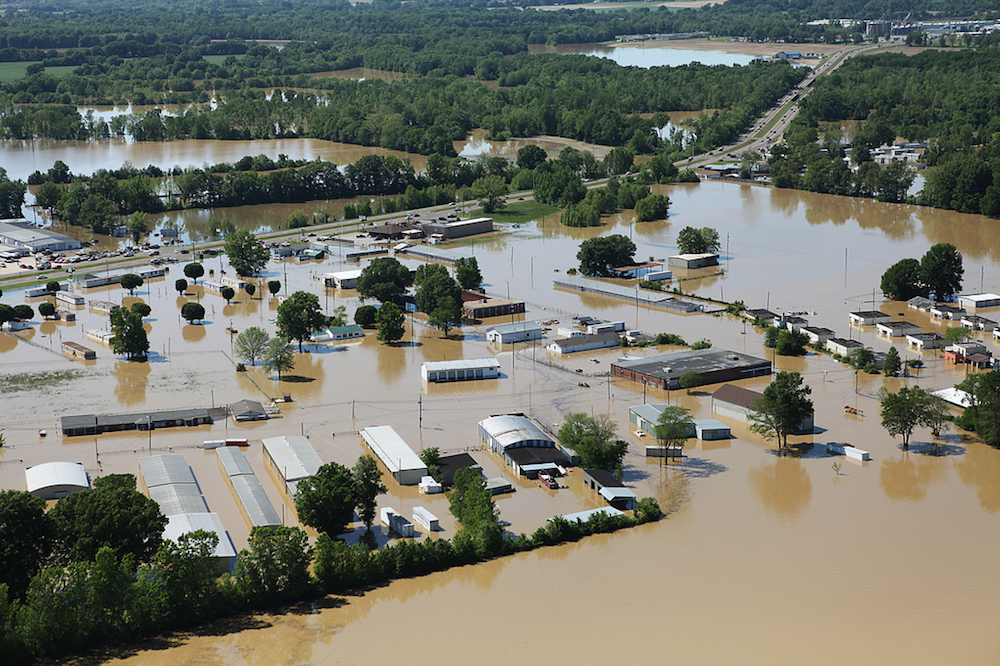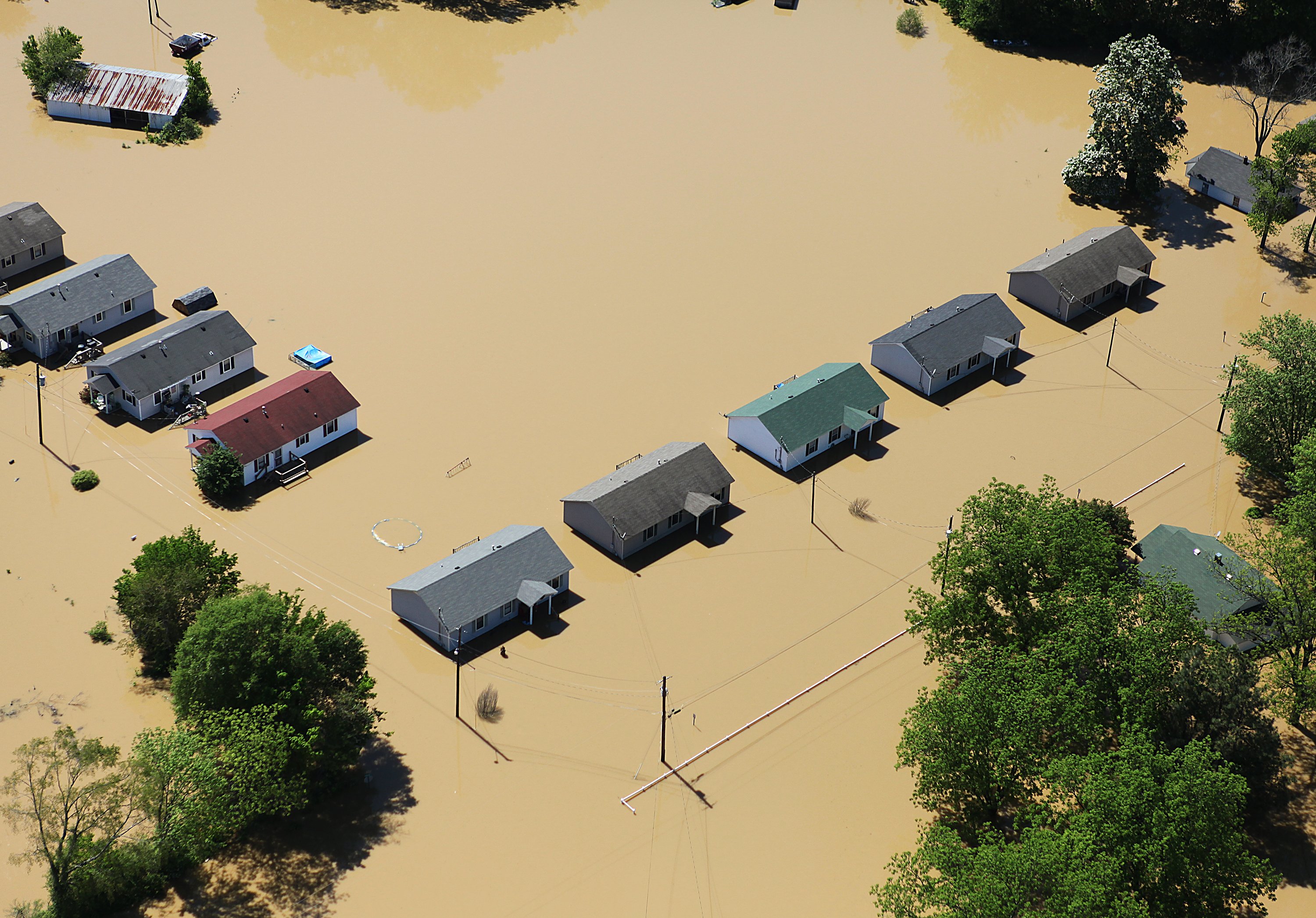Risky Business: Which Cities in the Nashville Area Are Least Protected by Flood Insurance?

by John Egan
March 16, 2017
The May 2010 flood in Nashville, TN, was one for the record books.
In more than 140 years of recorded history, Nashville had never seen so much rain -- more than 17 inches -- in such a short span. The record-breaking flood killed 11 people and caused about $2 billion in damage to private property, according to Nashville government officials. The Cumberland River, which snakes through the Nashville metro area, swelled 12 feet above flood stage.
Yet for whatever reasons, some communities in the Nashville metro area barely have any flood insurance, in spite of the destruction wrought by the 2010 flood.

The 2010 flood caused about $2 billion in damage in the Nashville area.
Photo: David Fine/FEMA
A LawnStarter analysis of data from the National Flood Insurance Program, part of the Federal Emergency Management Agency (FEMA), shows two Maury County suburbs -- Columbia and Spring Hill -- have the lowest per-capita flood insurance coverage of any communities in the Nashville area. Columbia had 2.91 flood insurance policies per 1,000 residents as of Dec. 31, 2016, our analysis shows, while Spring Hill had 3.0 per 1,000.
On the other end of the spectrum, Brentwood had the highest number of policies per 1,000 residents -- 10.94 -- with Nashville in second place at 9.45. Statewide, the rate was 4.48 per 1,000 residents.
Our analysis encompasses the 12 most populous cities in the Nashville metro area. See the graphic at the bottom of this article for details about flood insurance coverage in the region.
Coverage in Columbia
Ty Cobb, acting fire chief in Columbia, says city officials have discouraged developers from building in the local floodplain, perhaps translating into a smaller overall share of property owners now being required to buy flood insurance. The City of Columbia has received several grants from FEMA to buy and demolish structures in the floodplain, he says.
Kim Schofinski, a spokeswoman for the Tennessee Department of Environment and Conservation, points out that property owners in Columbia and Spring Hill hold nearly all the federally backed flood insurance policies in Maury County. In all, a little over 200 of those policies are in place throughout the county.

Downtown Nashville “has to be protected” from floodwaters, U.S. Rep. Jim Cooper has said.
Photo: United Way of Metropolitan Nashville
Do You Need Flood Insurance?
Even though some property in Maury County is outside the floodplain, that doesn’t mean the property is immune from flooding. Loretta Worters, a spokeswoman for the Insurance Information Institute, notes that flooding can happen away from major bodies of water, such as during a heavy rainstorm.
Standard homeowner’s, renter’s and business insurance policies don’t cover damage caused by floods. Anyone who owns property in a federally designated floodplain and has a federally backed mortgage is required to obtain flood insurance through the National Flood Insurance Program or a handful of private insurers.
Property owners who aren’t in a floodplain “need to assess their risk and understand the dangers of not buying flood insurance,” Worters says. “Keep in mind that one in four flood claims is for a home that isn't in a floodplain.”

Vince Young, then a Tennessee Titans quarterback, helped with Nashville flood cleanup efforts.
Photo: Marty Bahamonde/FEMA
Few American Homeowners Have Coverage
Generally speaking, a flood insurance policy costs $700 to $800 a year, according to Worters. Insurance rates depend on how close you are to a coastal area, what type of structure is being covered and other factors. If you’re a homeowner, a flood insurance policy from the federal program covers up to $250,000 for the structure and $100,000 for the contents.
A 2016 poll by the Insurance Information Institute found that 12 percent of American homeowners had flood insurance. So, why are 88 percent of American homeowners not covered in the event of a flood?
“Cost is a factor for some people. Others just don’t think it will happen to them,” Worters says.
In the graphic below, you can find the per-capita flood insurance coverage rates for 12 communities in the Nashville area. All insurance data, retrieved in March 2017, came from the National Flood Insurance Program. Population data came from the U.S. Census Bureau.
Embed this graphic onto your site! (copy the code below)
Top Photo: David Fine/FEMA
Related Posts

The 3 Best Places in the Nashville Area to Have a Yard Sale

5 Preparations For Your Nashville Grass This Spring

The Top 5 Most Glamorous Gardens in Nashville, TN
LawnStarter is Nashville's most convenient lawn care service
Easy 5 minute booking
Nashville's top-rated lawn pros
Online account management